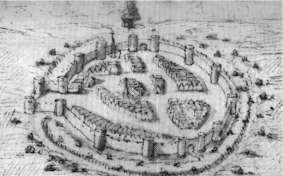Dülken is a part of the the Viersen District in North Rhineland-Westphilia. Dülken was formerly and independent town, but joined with Viersen and two other municipalities to become the Viersen District in 1968.
 | |
| Dülken, North Rhineland-Westphilia, Germany |
The location that is now the town of Dülken has long history. Originally the region was inhabited by the Eurones, who were the later eradicated by the Romans in 54 BC after a revolt which resulted in the destruction of the 14th Legion. There are some accounts stating that some of the tribe survived and integrated into the other tribes migrating into the region. The Romans remained until the middle of the fifth century and rule shifted to the Franks.
 | |
| Ambiorix, leader of the Eurones |
The first mention of Dülken was in 837 where it was referred to as a County (ruled by a Count). The municipality received its Charter in 1364, making it the oldest town in the Viersen District. The Dülken Blacksmith's Guild was founded in the town in 1433. In 1533 over one third of the city burned to the ground. Between 1568 and 1609 the number of towers in the town increased from twelve to nineteen.
Due to its location in the region, Dülken played a role in many conflicts over the century. Spanish troops occupied Dülken in 1624 as a result of the Thirty Years War. In 1794 Dülken fell to the French and the region was annexed to France. In 1801, the citizens of Dülken became officially French Citizens. In 1814 Dülken was freed from French occupation.
 | |
| Dülken in 1723 |
In 1928 the first attempt to merge Dülken with Viersen was rejected. Dülken suffered bombing throughout the Second World War and accepted displaced refugees from Eastern Germany in 1945. The merger with Viersen was appoved by a narrow margin in 1968.
 | |
| Dülken and surrounding areas |
The town of Dülken has long been a center of commerce and industry. Like most very old German communities, there are established cultural customs and traditions that have been practiced throughout the centuries which make the community unique.
 |
| Dülken Coat of Arms |
No comments:
Post a Comment